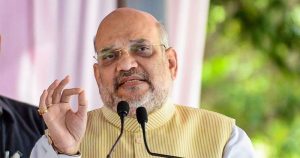
New Delhi, August 20, 2025:
Union Home Minister Amit Shah tabled the 130th Constitution Amendment Bill, along with two other key legislations, in the Lok Sabha on Wednesday. The move triggered a stormy protest from Opposition MPs, who alleged that the bill violates constitutional norms and is politically motivated.
The bill seeks to bar Prime Ministers, Chief Ministers, or any minister from continuing in office if they are accused in a case punishable with five years or more of imprisonment and remain in judicial custody for 30 days or longer.
Amit Shah’s Firm Stand: “Should the Nation Be Run from Jail?”
Responding to the Opposition’s protest, Shah issued a strong statement on social media platform X, saying:
“In view of the Modi government’s commitment to fighting political corruption and the public’s growing outrage, I have introduced a constitutional amendment in Parliament—approved by the Lok Sabha Speaker—that ensures no individual holding a significant constitutional post such as Prime Minister, Chief Minister, or Minister can run a government while in jail.”
He further emphasized that the bill aims to restore integrity in public life, addressing the decline in ethical standards in politics.
Key Provisions of the Bill:
Ineligibility After 30 Days in Custody:
If any minister, CM, or PM is arrested in a serious criminal case and fails to obtain bail within 30 days, they will be legally disqualified from holding office. If granted bail after this period, they may return to office.
Moral Responsibility Clause:
Shah remarked that the founding fathers of the Constitution never envisioned a situation where public representatives would refuse to resign even after being jailed. Recent incidents, he said, have created an unprecedented ethical crisis in governance.
Legal Recourse for the Accused:
The bill includes a safeguard, allowing the accused leader to secure bail within 30 days of arrest. If they do not, on the 31st day, the Prime Minister or the Chief Minister (as applicable) is required to remove them from office.
Opposition’s Sharp Rebuttal
Opposition MPs from the Congress, Samajwadi Party, TMC, and AIMIM’s Asaduddin Owaisi vocally opposed the bill, calling it an assault on the Constitution. Tensions escalated in the House as MPs tore and flung copies of the bill toward Amit Shah and threw paper missiles in protest.
Amid the chaos, Shah reiterated that the government proposes to send the bill to a Joint Parliamentary Committee (JPC) for further scrutiny.
The Larger Context
The bill comes in the wake of recent controversies where ministers and CMs remained in power while in jail. The government argues that this loophole allows ethically compromised leadership to exploit legal delays and retain political authority, eroding public trust in governance.
Shah concluded his remarks with a pointed question:
“The people of India must decide — is it acceptable for someone to govern the country while being in jail?”